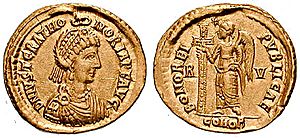Justa Grata Honoria facts for kids

Justa Grata Honoria, often known simply as Honoria, was born around 418 AD and died around 455 AD. She was the older sister of Valentinian III, who was the Roman Emperor of the Western Roman Empire. Honoria became famous for sending a message to Attila the Hun, asking for his help. This message led Attila to claim he had a right to rule the Western Roman Empire.
Coins from her time show that she was given the special title of Augusta not long after her brother became emperor in 426 AD. This title was usually given to empresses or other important women in the imperial family.
Contents
Honoria's Family Background
Honoria was the only daughter of Constantius III, who later became an emperor, and Galla Placidia. Her first two names, Justa and Grata, honored her mother's sisters. Her third name, Honoria, was given after her half-uncle, Honorius, who was the emperor when she was born.
Honoria had a half-brother named Theodosius, who was born in 414 AD from her mother's first marriage to Ataulf, a king of the Visigoths. However, Theodosius died when he was a baby, before Honoria was born. Her younger brother, Valentinian III, was her full brother, meaning they shared both parents.
Honoria's Life and Challenges
Most of what we know about Honoria's life comes from short mentions or hints in old historical records. Historians know she traveled with her mother and younger brother to Constantinople in the spring of 423 AD. She was also with them when they joined an army in Thessalonica in the summer of 424 AD. This army helped Galla Placidia and Valentinian regain power in the Western Roman Empire.
Honoria was even shown in mosaics, which are art made from small pieces of colored stone or glass, in important churches in Rome and Ravenna. These mosaics, which are now lost, showed her as part of the imperial family. A poem written around 443 AD also mentions her as a member of Valentinian III's family.
Honoria believed her brother, Emperor Valentinian III, was weak and not very active. At one point, her brother decided she should marry a Roman senator named Bassus Herculanus. This senator was considered "safe" because he was not likely to use his connection to the imperial family to try and take the throne. Honoria did not want this marriage.
The Plea to Attila the Hun
In the spring of 450 AD, Honoria decided to seek help from Attila the Hun, a powerful leader. She sent him a message asking for his assistance, and she also sent him her ring. While Honoria might not have meant to propose marriage, Attila chose to understand her message as a marriage proposal.
Attila accepted what he believed was a proposal. He then demanded half of the Western Roman Empire as her dowry, which is money or property a bride brings to a marriage. When Emperor Valentinian III found out about his sister's plan, he was very angry. Only the strong influence of their mother, Galla Placidia, stopped him from killing Honoria. Instead, he sent her away from the capital. He also wrote to Attila, strongly denying that any marriage proposal was real or valid.
Attila had been planning to invade the Roman Empire for years. Honoria's letter gave him the perfect reason to begin his attack. In 451 AD, Attila sent a messenger to Ravenna, the capital of the Western Roman Empire at the time. The messenger declared that Honoria was innocent and that her marriage proposal was legitimate. Attila stated he would come to claim what he believed was rightfully his. Attila made a similar demand in 452 AD, which was followed by his unsuccessful invasion of northern Italy.
Honoria's Later Life
There are no records of Honoria's life after her dealings with Attila. It is generally thought that she was married to Herculanus, as her brother had planned. However, one historian wrote that Honoria was "freed from her danger at this time," which might suggest she faced other problems later.
Honoria's name does not appear on the list of important people taken to Carthage by the Vandals after they attacked and looted the city in 455 AD. Her sister-in-law and nieces were captured, and her brother was murdered during this event. Because Honoria is not mentioned, some historians believe she had already died by then. It is not known if she died naturally or if her brother, the Emperor, ordered her death. There is not enough evidence to be sure.
Portrayals in Media
Honoria has been shown in several films and TV shows:
- She was played by Sophia Loren in the 1954 movie Attila.
- Kirsty Mitchell played her in the 2001 TV miniseries Attila.
- She was portrayed by Ivelina Ivanova in the 2016 docudrama Barbarians Rising.
- Kate Nesbit played her in a 2015 stage performance of the 1896 play Attila, my Attila by Michael Field.
Images for kids
See also
 In Spanish: Honoria para niños
In Spanish: Honoria para niños
 | Bayard Rustin |
 | Jeannette Carter |
 | Jeremiah A. Brown |


